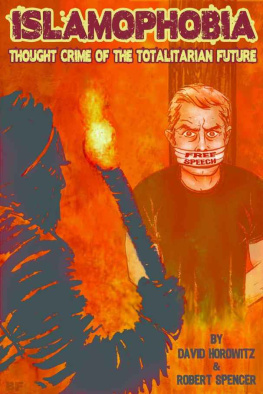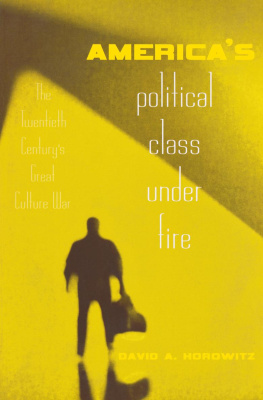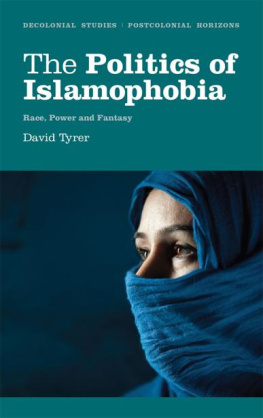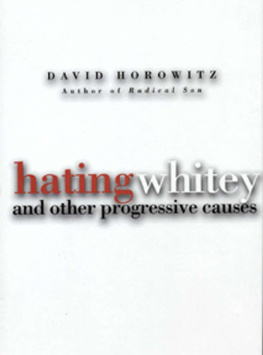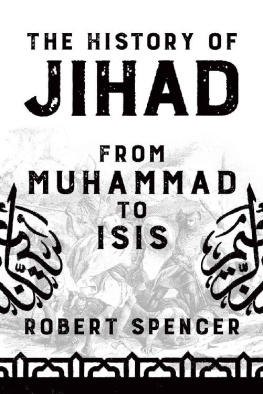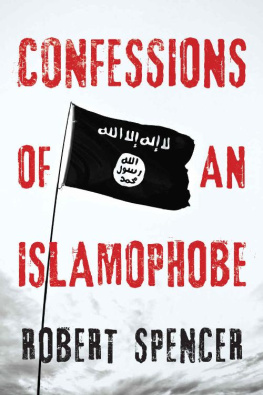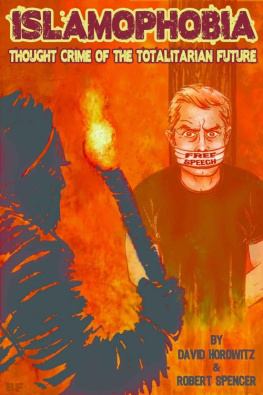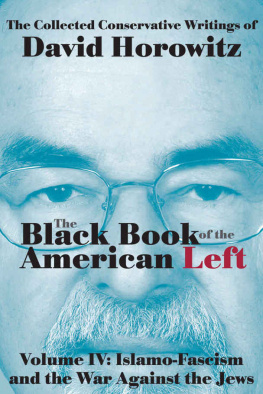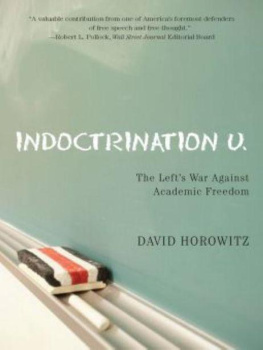David Horowitz and Robert Spencer - Islamophobia: Thought Crime of the Totaltarian Future
Here you can read online David Horowitz and Robert Spencer - Islamophobia: Thought Crime of the Totaltarian Future full text of the book (entire story) in english for free. Download pdf and epub, get meaning, cover and reviews about this ebook. year: 0, genre: Politics. Description of the work, (preface) as well as reviews are available. Best literature library LitArk.com created for fans of good reading and offers a wide selection of genres:
Romance novel
Science fiction
Adventure
Detective
Science
History
Home and family
Prose
Art
Politics
Computer
Non-fiction
Religion
Business
Children
Humor
Choose a favorite category and find really read worthwhile books. Enjoy immersion in the world of imagination, feel the emotions of the characters or learn something new for yourself, make an fascinating discovery.
- Book:Islamophobia: Thought Crime of the Totaltarian Future
- Author:
- Genre:
- Year:0
- Rating:3 / 5
- Favourites:Add to favourites
- Your mark:
- 60
- 1
- 2
- 3
- 4
- 5
Islamophobia: Thought Crime of the Totaltarian Future: summary, description and annotation
We offer to read an annotation, description, summary or preface (depends on what the author of the book "Islamophobia: Thought Crime of the Totaltarian Future" wrote himself). If you haven't found the necessary information about the book — write in the comments, we will try to find it.
Islamophobia: Thought Crime of the Totaltarian Future — read online for free the complete book (whole text) full work
Below is the text of the book, divided by pages. System saving the place of the last page read, allows you to conveniently read the book "Islamophobia: Thought Crime of the Totaltarian Future" online for free, without having to search again every time where you left off. Put a bookmark, and you can go to the page where you finished reading at any time.
Font size:
Interval:
Bookmark:
David Horowitz Freedom Center
PO BOX 55089
Sherman Oaks, CA 91499-1964
www.frontpagemag.com
In George Orwell's futuristic nightmare, 1984 , citizens are watched by a secret police for "thought crimes" committed against the totalitarian state. These thought crimes are simply attitudes and ideas the authorities regard as politically incorrect.
Orwell wrote 1984 during the height of the Cold War and its vision reflected an all-too-real fact of life. The Soviet police state had spread its tentacles over hundreds of millions of captive peoples. Tens of millions of them whose ideas failed to conform to the prescriptions of the totalitarian state were sent to labor camps and firing squads for committing thought crimes. Their offense was to be "anti-Soviet" to speak out against socialism, or its rulers, or to fail to parrot the views and opinions approved by the regime.
During the Cold War, America led a coalition of democracies to oppose Communism because America's founders had made the principle of liberty the cornerstone of their Republic. The very first article of the American Bill of Rights was not to have one's speech restricted by the power of the state.
This First Amendment freedom guaranteed citizens the right to dissent from orthodoxy, to criticize the powerful, and to tell the truth as they saw it without fear of reprisal. This freedom is the absolute and indispensable basis of every other freedom that Americans enjoy. For without the right to dissent from the opinions of the state, every other freedom can be taken away. Without this right, every dissent from the policies and practices of the state would be a thought crime.
"Islamophobia" is the name that has been given to a modern-day thought crime. The purpose of the suffix in the term "Islamophobia" is to suggest that any fear associated with Islam is irrational whether that fear stems from the fact that its prophet and current-day imams call on believers to kill infidels, or because the attacks of 9/11 were carried out to implement those calls. Worse than that, it is to suggest that such a response to those attacks reflects a bigotry that itself should be feared.
Those with a perspective on history, however, will take a different view. In the fall of 2005 global Muslim riots resulted in the deaths of over 100 people. The riots were triggered by the publication of cartoons in Denmark depicting the Islamic prophet Muhammad.1 In the wake of these religiously inspired outrages, a group of internationally reknowned writers issued a manifesto called, "Together Facing the New Totalitarianism."2 One of the writers, Salman Rushdie, had himself been the target of such attacks after the Islamic leader, Ayatollah Khomeini, issued a fatwa calling on all Muslims to kill him. His offense? Insulting the prophet Muhammad in a novel. Rushdie was forced to go into hiding for several years and was only able to regain his freedom after the Ayatollah's demise, although every year the Islamic Republic of Iran renews the death sentence.
1 http://en.wikipedia.org/wiki/Timeline_of_the_Jyllands-Posten_Muhammad_cartoons_controversy
2http://news.bbc.co.uk/go/pr/fr/-/2/hi/europe/4764730.stm
The manifesto issued by Rushdie and his fellow writers said: "After having overcome fascism, Nazism, and Stalinism, the world now faces a new global totalitarian threat: Islamism .... We, writers, journalists, intellectuals, call for resistance to religious totalitarianism and for the promotion of freedom, equal opportunity and secular values for all. We refuse to renounce our critical spirit out of fear of being accused of 'Islamophobia,' a wretched concept that confuses criticism of Islam as a religion and stigmatization of those who believe in it. We defend the universality of the freedom of expression, so that a critical spirit can exist in every continent, towards each and every maltreatment and dogma."3
3 Ibid.
Islam is often defended as a religion no different from Christianity, Hinduism, Judaism and most other faiths. But this overlooks the fact that unlike other modern faiths, Islam is a political religion. Islam has had no reformation since its founding in the 7th Century, and Muslims recognize no separation between religion and state. In its canonical texts and teachings, Islam regards all other religions (and non-religions) as "infidel" creeds, and instructs believers to regard themselves at war with those who will not submit to the Muslim God. Unlike Christians or Jews, Muslim leaders seek to establish a global Islamic state or "caliphate" that would impose Islamic law on individuals everywhere and thus criminalize heretical thoughts.
Political Islam's global ambition is openly stated. The president of the Islamic Republic of Iran, Mahmoud Ahmadinejad, has said: "Have no doubt... Allah willing, Islam will conquer what? It will conquer all the mountain tops of the world."4 In 1990 the 56 member states of the Organization of the Islamic Conference (OIC) met in Egypt and adopted the "Cairo Declaration on Human Rights in Islam." The Cairo Declaration states that, "all human beings form one family whose members are united by their subordination to Allah."5
4"Iran's New President Glorifies Martyrdom," Middle East Media Research Institute, July 29, 2005.
5 Cairo Declaration on Human Rights in Islam , August 5, 1990.
These are religious statements, but they are made by political authorities. Moreover, they are in complete accord with traditional Islamic theology. In his 1955 book War and Peace in the Law of Islam, Majid Khadduri, an internationally renowned scholar of Islamic law, wrote: "The Islamic state, whose principal function was to put God's law into practice, sought to establish Islam as the dominant reigning ideology over the entire world.... The jihad was therefore employed as an instrument for both the universalization of religion and the establishment of an imperial world state."6
6 Majid Khadduri, War and Peace in the Law of Islam , Johns Hopkins University pres, 1955. P. 51.
Because the tenets of Islamic belief are not open to question, and because as a religion Islam prescribes moral behavior for every aspect of individual and social life, Islamic law sharia is by its very nature totalitarian. A religion that recognizes no principle of separation from governmental authority, whose prescriptions dictate what is proper for every aspect of private life is the very definition of totalitarian rule. Where Islam becomes the religion of the state, violations of Islamic doctrine and heretical thoughts are inevitably seen as crimes against the state. (now called The Organization of Islamic Cooperation) is composed of the fifty-six Islamic nations plus the Palestinian Authority.7 At present, only Saudi Arabia and Iran, along with Islamic northern Sudan and most of Somalia, are states where Islamic law is fully implemented. Other Islamic states, such as Pakistan, Egypt and Indonesia are currently governed by a mixture of Western and Islamic law. Even in such "moderate" majority-Muslim states, however, Christians are violently persecuted as infidels and non-Muslims in general are denied basic rights. Even in these states, apostasy is not tolerated. Converts from Islam to other religions are routinely threatened, harassed, jailed and even executed under existing state law. In short, even in "moderate" Muslim states the penalty for deviation from the accepted religious orthodoxy is severe, and in each of these states there are radical Islamic movements pushing for more stringent conformity to Islamic law.
7 It changed its name in July 2011 from the Organization of the Islamic Conference.
Font size:
Interval:
Bookmark:
Similar books «Islamophobia: Thought Crime of the Totaltarian Future»
Look at similar books to Islamophobia: Thought Crime of the Totaltarian Future. We have selected literature similar in name and meaning in the hope of providing readers with more options to find new, interesting, not yet read works.
Discussion, reviews of the book Islamophobia: Thought Crime of the Totaltarian Future and just readers' own opinions. Leave your comments, write what you think about the work, its meaning or the main characters. Specify what exactly you liked and what you didn't like, and why you think so.

